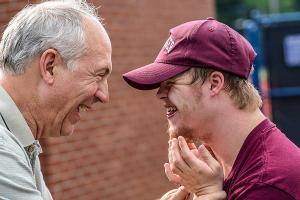
After forced abortion threat, disability advocate says support is key to fight eugenics
FREE Catholic Classes
In the face of an increasingly 'eugenic' mentality toward people with disabilities in Europe -- exemplified in the recent overturned forced abortion case -- a Catholic disability expert says parishes should be looking at how to further support people with disabilities and their families.

Highlights
London, England, (CNA) - "Each and every person has been created in the image of God. There is no decision made about who can or cannot be born -- that's God's choice," disability theology specialist Cristina Gangemi told CNA.
"It is a type of eugenics here where they are beginning to say for the 'well-being' of this person who 'cannot' go through birth, who 'cannot' look after the child, the best thing to do is to kill their offspring," she said.
Gangemi is the director of the UK-based Kairos Forum, a consultancy that helps communities and organizations respond to the educational and spiritual needs of people with disabilities. For the past 25 years, Gangemi has worked with people with intellectual disabilities, like the woman involved in the recent attempted forced abortion case.
In this case, "the judge was saying that she wouldn't be able to cope with the birth and she wouldn't be able to cope with the child being taken away, but if she had an abortion, she would, at 22 weeks, still have had to give birth to a dead baby and the baby would have been taken away dead. That is what would have caused psychological problems to the young woman," Gangemi explained.
"We can always work with her to help her understand the life she has within her and beyond her. And who says that that young woman is not able to give that child an immense amount of love?" she said.
"If I were called into work with this family, or if I were called to advise the parish or the diocese in which the family lived -- because we don't know who they are -- I would be working with the local church to help them first of all understand the canonical duties that they have toward families such as this, and I would be looking to work with symbols, pictures, body language, and music to help the young woman understand what it means to be a mother," she said.
"She might not be able to reason out now and we shouldn't even be expecting that, but what we can become is ... creative teachers through love," Gangemi explained.
"In my years working in the field I have never met anybody who can't learn. I've met lots of people who learn creatively, but I've always met people who can learn," she said.
"We turn our gaze back to God and we begin to work creatively and accompany such a family, helping this young woman and her family not to be burdened by society's judgement, but to be celebrated by the Church's face," she said.
Concerns have been raised for years over the treatment of those with disabilities in Europe. Disability advocates voiced alarm in 2017 when Iceland declared that it had "eradicated Down syndrome," because 100% of babies who were diagnosed with the condition were aborted. Many other European countries also have high rates of abortions of children with Down syndrome.
Gangemi is currently working on a program called "Icons of Christ," which will be a resource to help parishes approach the lives of people with intellectual disabilities pastorally when they request support for marriage preparation and living family life.
"Importance needs to be given to people with disabilities in faith communities. They have to be seen for who they are, members of the Body of Christ, and therefore there have to be creative practices within our Church that are not just special parishes or special Masses," she said.
"People with disabilities should be catechists, protagonists, active members of the Church. They should be participants rather than recipients ... This is no special program. This is Catholicism at its finest," she said.
---
'Help Give every Student and Teacher FREE resources for a world-class Moral Catholic Education'
Copyright 2021 - Distributed by Catholic Online
Join the Movement
When you sign up below, you don't just join an email list - you're joining an entire movement for Free world class Catholic education.
An Urgent Message from Sister Sara – Please Watch
- Advent / Christmas
- 7 Morning Prayers
- Mysteries of the Rosary
- Litany of the Bl. Virgin Mary
- Popular Saints
- Popular Prayers
- Female Saints
- Saint Feast Days by Month
- Stations of the Cross
- St. Francis of Assisi
- St. Michael the Archangel
- The Apostles' Creed
- Unfailing Prayer to St. Anthony
- Pray the Rosary
![]()
Copyright 2026 Catholic Online. All materials contained on this site, whether written, audible or visual are the exclusive property of Catholic Online and are protected under U.S. and International copyright laws, © Copyright 2026 Catholic Online. Any unauthorized use, without prior written consent of Catholic Online is strictly forbidden and prohibited.
Catholic Online is a Project of Your Catholic Voice Foundation, a Not-for-Profit Corporation. Your Catholic Voice Foundation has been granted a recognition of tax exemption under Section 501(c)(3) of the Internal Revenue Code. Federal Tax Identification Number: 81-0596847. Your gift is tax-deductible as allowed by law.








